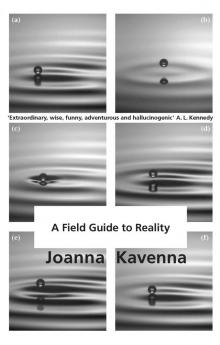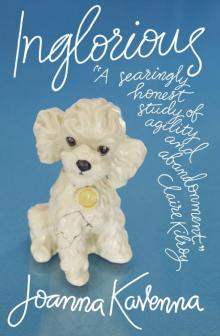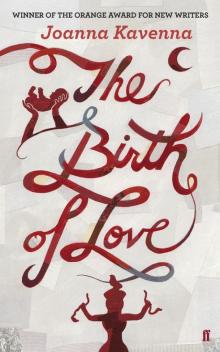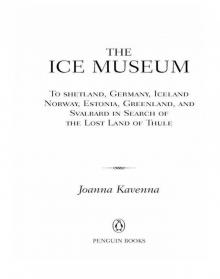- Home
- Joanna Kavenna
A Field Guide to Reality Page 2
A Field Guide to Reality Read online
Page 2
I realised then the phone was ringing. I had fallen asleep earlier, a book in my hand. I glanced at my watch and saw it was only midnight.
I picked up the phone and heard a man saying, ‘Is that Eliade Jencks? I’m very sorry to disturb you.’
I struggled to the window and looked out at the street which was – blanked out. A dense mist coiled around the yellow streetlights. The voice was saying – ‘I’m a colleague of Professor Solete. I believe he was a friend of yours?’
So I knew Solete was dead.
Why else do people call you at midnight?
*
When I looked at my watch I saw the date was January the fourth. Deep within the phone, this voice was telling me how sorry he was. How it had been swift. Painless. Solete had greeted the porter and checked his pigeonhole. Then he had gone up to his room as usual and –
‘He didn’t suffer.’
‘How do you know?’ I said.
‘I mean, it was very sudden. As if he was hit by a thunderbolt.’
In the mist, the houses had blurred into a single line of bricks. His name was Anthony Yorke, he told me, and he was a historian of ideas at Solete’s college, Nightingale Hall. He had been placed in charge of Solete’s literary estate, by order of the college. I imagined illustrious fellows, like venerable birds, huddled in a feathery cluster in a wood-panelled room, holding fountain pens in their shivering beaks.
‘We’d like you to come over to the college tomorrow. There’s something about the estate that we need to discuss.’
‘We?’
The venerable birds.
‘The fellows.’
I imagined Solete as a boy, adored by his mother and father; I saw him at every phase of his life, rushing through his youth, vigorous and committed, falling in love, marrying a brilliant scholar he later mourned so deeply, Asta Rose. And all the further years and decades of Solete’s life. The days must have seemed continuous, and yet now his lifespan was complete.
Anthony Yorke was saying that there was a box in Solete’s room, with For Eliade on the lid. This interested me, because Solete had mentioned a grand project on a few occasions, something he aimed to complete – before he died. It was, he claimed, his life’s work, and its central themes were reality and truth; or, how it is that we see what we see, and how we know whether what we see is real. It was, he explained, one more mark on the great page of philosophical enquiry. He refused to tell me anything else, except that he jokingly referred to it as A Field Guide to Reality.
‘Among his papers he explains that the box can only be opened by you,’ Yorke was saying. ‘My colleagues and I wondered if you might come to Solete’s rooms in college, first thing tomorrow?’
We haggled briefly over a feasible time, and how I had to work, and how the scholarly birds had to impart their wisdom to the young, then Yorke said he would look forward to our meeting. He was wildly over-excited because he wanted to open the box of treasure.
We said goodbye.
*
I was thinking of Solete and his decades of enterprise, and I was still trying to register the fact of his death. I kept thinking of questions I had failed to ask him. I had always intended to sit down with him and interview him, about his childhood, and his youth, and his further thoughts on existence and reality. He had been effortlessly erudite; I had always loved to talk to him. I went back to bed and tried to apprehend the truth: that he had descended into the realm of shadows, or the vaporous terrain of nowhere. A few times I was nearly asleep when, suddenly, I jolted awake in pure existential panic, afraid of the eternality of death and even about to scream. The night was viscous; darkened mist swirled at the windows, as if the air was charred. At some point and despite my overall perplexity I must have fallen asleep because I dreamed I was talking to Solete. He was there and he was telling me he was dead. I said I was so sorry, and I was so entirely sorry, I wanted to cry again.
‘We are made of stardust,’ he said. ‘Isn’t that strange?’
I woke and the sky was silver-white. I couldn’t work out what I had dreamed and what I had remembered. I went downstairs and turned on all the lights.
*
By nine a.m. I was running down the Cowley Road, towards Nightingale Bridge. The whole place was covered in whitewash, someone had hurled it over the trees, so they looked petrified. Everyone was walking so fast, they kept colliding in the mist. And in the doorways of the shops people said, ‘Mist? Ridiculous! So cold. Soaks your brain.
You can’t think clearly. You go deaf. It’s like wool in your ears.’
A man with a phone at his mouth, keeping pace alongside me: ‘Becca’s taken the car but she’ll never get anywhere in this. Perpetual misery.’
I passed Nun’s Hall, the first women’s college – they used to chain the women to the furniture, so they didn’t get distracted by Sin.
People round me wiped their hands, puffing at each other. ‘So awful, so thick and wet.’
Vapour, it gets you in the end. The body is almost entirely water. The last thing you need is to get whirled around in wet air. You might dissolve!
Now I was passing Hawk Plain, with Café Woodcock to my right – the windows slimy with condensation. Bodies moving inside. In Kepeharm Hall they train the priests. For Thine is the Kingdom.
KNOWN FACTS ABOUT NIGHTINGALE HALL
Nightingale Hall – founded by Sir Richard Black (1492–1567), who was Master of the Merchant Taylor Company and Lord Mayor of London. He was a supporter of the Catholic Queen Mary Tudor, daughter of Henry VIII. At least, he said he was in public. His inner thoughts were, of course, private. Yet he officially backed Mary; he sat by while the Queen burnt all her heretics and for this certain propping up of the establishment, while it was, briefly, the establishment, he was rewarded with land in the centre of Oxford, a fine location near St Giles (pie shops, a church), fields and countryside to the north. The college was founded to support Mary’s strong-minded efforts in religious conversion and when Mary’s soul left her body amen a few fellows had to flee, including Richard Cartwright, the famous poet. (‘Sort the roses from the weeds . . . for time is all a-fleeting . . .’)
Black’s widow died without issue, as they say, and so she left all her wealth to Nightingale Hall.
Nightingale Hall has a beautiful setting on Nightingale Bridge, which spans the River Cherwell. The College is known for its May Day celebrations, when the choristers of Nightingale School stand on the top of the college tower, and sing like angels to herald the advent of Spring. There are gargoyles all along the front of Nightingale Hall, peering down at Unicorn Street. Beasts spouting water, men snarling in agony, and two young women, asleep.
*
Through the mist, a hallowed quad or two. The Porter, a saturnine figure of indeterminate age, told me how sorry he was about Professor Solete.
‘A major gap in our lives,’ he said. Then he went back to reading the paper.
But then, what else could he do?
*
Solete’s room was on staircase XXIII. The door opened onto the expected scene: antique furniture, learned detritus. Three scholars, displayed in armchairs. It turned out I had met Anthony Yorke before, at a party. I was disoriented when he rang at midnight, and failed to make the connection. Besides, my mind was on other things. He seemed to be experiencing a similar moment of confusion, mingled perhaps with slight dismay. But, who can tell what others are thinking?
‘Duncan Saunders’s party,’ I said to him. ‘That’s where we met, I mean.’
‘Yes, yes, of course,’ he said, politely. ‘Are you a friend of his?’
*
Duncan Saunders makes things from wood. Assembles them in public spaces. Calls them ‘happenings’ so no one will judge him too harshly.
‘This is Anthony Yorke,’ Duncan had said, standing back to reveal a big man, with white-blond hair. Running out of a broken marriage, though I didn’t know that. ‘He’s new.’
Hand out, clammy fingers.
‘Nightingale Hall,’ he said. Christ, I thought, an academic.
Nod politely now, recover later.
‘And you?’ he said.
‘No no, I really don’t do much,’ I said.
One thing I’ve learned, is not to tell anyone anything. It seems by far the best option. So many people just unwind the whole thing, the moment you ask them a single question. Then you get all this stuff, life detail, well, it’s cumbersome, yards and yards of it, mile upon mile, unravelled towards you, until you’re stumbling under the weight. So I say as little as possible. Damage limitation. No one can hold you to account, no one can judge you. Yet, Anthony lacked my defensive restraint. He twitched, and then he spoke. He was working on something so esoteric I’d blinked a hundred times before he’d got halfway through it. ‘A potted summary,’ he said. I couldn’t imagine what the extended version sounded like. You’d have to sit down. Nurse a triple whisky. Then you might stand a chance of enduring it . . .
‘I study ancient theories of Light,’ he said. ‘Rainbows, for example. How many colours does a rainbow have?’
‘Is that a trick question?’
He laughed. ‘You need a lot of time, for this sort of thing,’ he said. ‘The whole world. Your entire being. You have to pick it apart slowly.’
‘Why?’ I said.
‘Because . . .’ He paused. ‘Well,’ he said. ‘You pick it apart, and then you do it to yourself, demolish yourself, and then you think the rest of the world will come too . . . but it doesn’t. Everyone else just sits there . . . Happy, talking about verisimilitude. Like a pack of madmen. Women too.’
‘You’re just an elitist,’ I said. ‘And don’t pretend to me you care what women do.’
That just set him off on another paragraph. Perhaps it was seven pages, without a pause, that sort of thing. What? Another fifteen, did I want a thesis?
‘OK, you care deeply,’ I said. ‘It’s moving how you care.’
Did I want a drink? We stood apart, we talked about the crowd. He’d come from London, he told me. All the way, to Oxford, to a small room at Nightingale Hall. There to discuss—
No no, he was going to tell me again –
‘Really, it’s OK,’ I said. ‘I believe you . . .’
*
This morning, he put his hand out again, and I shook it. We were both being very formal and serious. Behind him: a tumbling array of books, papers, tattered sofas, sketchy carpet, curtains half-drawn across aged windows – then beyond – the whiteness.
‘My colleagues,’ said Anthony. ‘Sasha Petrovka and Patrick O’Donovan . . . Patrick teaches philosophy, and Sasha is our professor of Ancient Greek. We’ve all been tasked with administering the estate.’ I nodded towards a pair of real flinty sticks. Folding their flinty limbs into armchairs. Sasha Petrovka dressed all in black. Black gloves pulled up to her elbows. Long black skirt, black boots. Long face, long black hair. Sharp angles. Patrick O’Donovan in generic don. You couldn’t get much more don than that. Tweed jacket, mustard scarf, burgundy cords. Such a clash of shades and tones, as if he was daring you to protest.
But this is the Winchonian Blag, did you not know, you frightful peasant?
‘This is Solete’s friend and collaborator, Eliade Jencks,’ said Anthony. So they nodded and offered their condolences, told me how wonderful Solete had been. Anthony was pouring tea with a trembling hand. An untucked shirt, debased formality, an ancient suit.
‘Well, so, as we know, Solete was working for decades, with Asta Rose, and then alone after her death, on his great work . . . Solete was a philosopher, emphasis on the ancient world but curious and erudite in general, and Asta was a cosmologist, I think you could say, and they always said they encompassed past, present, future. By mistake.’
‘Theirs?’ said Petrovka.
‘I mean, happy coincidence. But really – they laboured away and then Asta died, er – I think it was . . .?’ Yorke turned to me.
‘Two decades ago,’ I said.
‘Absolutely.’ They all looked sorry again. ‘So, Solete continued on his own. He continued, for a very long time.’
‘He said he was just preparing the final elements,’ I said.
‘He was always deliberately vague,’ said Yorke.
Everyone was quiet for a moment – O’Donovan with his tragic-comic gnawed fingers and Anthony, leaning awkwardly against the desk. Petrovka was slumped in her chair, apparently deep in thought – yet I imagined that under her half-closed eyes she was watching like a hawk.
‘Well, Dr Churchwood’s pretty adamant,’ said O’Donovan. ‘He wants it for the college library.’
‘Someone should take charge of this,’ said Petrovka.
There was a painting above the mantelpiece, of the Thames as it meanders through Port Meadow. Layered hills reflected in the cold blue water. The room smelled of laundered handkerchiefs, pipe smoke, with a background trace of sherry. Solete once told me that he regarded his college as the home of lost causes. The young, so urgent, hustling towards a point they believed to be fixed and which would nonetheless recede, so it was always ahead of them. And the old, who were – said Solete – mainly glad they were still residual and present. His room was riddled with objects – books of course, stacked randomly, with scant attention to gravity, tumbling into dusty piles if you moved too swiftly.
There were photographs of Asta Rose who once had abundant silver hair and an expression of mocking enquiry. There were cards from so many dusty ancient scholars, an exhibition of writing styles. The place had lapsed into incoherence, and yet recently it had been explained by the presence of Solete. It seemed impossible that he was no longer alive. I rebelled against the fact; I found it reprehensible. The death of others rids you briefly of egotism, because you focus not, at all, on your own obsolescence – which will come – but on theirs, which has already occurred. It is peaceful agony, to mourn in this way, because at least it is agony focused on a single element. It is when you fall into mourning for everyone, humanity, the whole fragile fleeting edifice – that sends you mad!
Meanwhile, two stickle-backed velociraptors had come to inspect the rubble. I was not certain I trusted O’Donovan or Petrovka.
Anthony emerged, carrying a small chest, bearing it towards me like a votive offering.
He set it down on the desk, amidst tonnes of discarded paper, and fountain pens, and a Bavarian ornamental clock in the shape of a chalet. On the top was written, in Solete’s sloping hand, For Eliade.
‘In essence, it’s the property of the college,’ said O’Donovan.
‘That’s not true,’ said Anthony. ‘Look at what is written on the lid.’
‘For Eliade to open, for the college to guard, perhaps,’ said O’Donovan. He tried to smile charmingly, but his mouth was too wide, too lopsided, so the expression looked more like a sneer.
‘It belonged to Solete. And he has given it to Eliade, after his death,’ said Anthony.
‘College rooms. Property intrinsic,’ said O’Donovan.
‘No remote precedent for that.’
‘Well, in the case of sensitive objects, it might be possible to invoke, some kind of property – I mean – he was insured by the college. Wasn’t he?’
That really got Yorke roaming around the place. Knocking books over, sluicing down a cup of tea. ‘No, the bloody hell, I mean? Actually when something belongs to someone they can do whatever they like. I give it away, so it’s not mine anymore. Especially if I’m dead.’
‘Well, it’s a quandary,’ said O’Donovan. ‘I’ve got Churchwood hopping around – I saw him yesterday – and then it turned out it was bequeathed to this random stranger, he was almost crying with frustration – his big moment – great discovery – the Solete papers, the complete work, the man is inconsolable and if Solete wasn’t already dead he’d be off to lynch him.’
‘But it’s the request of the deceased,’ said Anthony again. ‘There can be no possible argument.’
‘But did Solete make it abso
lutely clear? Is the document signed?’ said Sasha Petrovka, joining in. ‘Can we see it?’
‘You don’t want to get Solete haunting you,’ said Anthony, mainly to Petrovka. But she didn’t care. You could tell. She would happily tell the ghost of Solete to stop menacing her and she would affright that poor shade all the way back to the underworld.
‘He won’t haunt anyone,’ said Petrovka. ‘He wasn’t that sort.’
‘Really, you’re certain of the dispositions and taxonomies of the afterlife?’ said Anthony. ‘So astounding. Certainty about the invisible . . .’
‘Anyway, there are distinctions. The peaceful dead and the raving ghouls,’ said O’Donovan. By now, he was biting his fingers. ‘I mean, he was paid by the college for five millennia or whatever it was and this is what he did. And so surely the college has some share of it? And isn’t there an obligation to keep it safe?’
‘Whatever it is,’ I said.
They all looked at me.
‘The irony is,’ I said. ‘You don’t even know.’
There was a pause, and then O’Donovan sighed, and tried to lift the lid of the box. No one expected it to open, and, as expected, it didn’t. He sighed again.
‘Where’s the key?’ said Petrovka.
‘Well, he sent it to you, didn’t he?’ said O’Donovan, turning to me.
‘No, he didn’t.’
‘Surely, he did,’ said Petrovka. They were both looking at me as if I were hiding something. But I really didn’t have a key.
‘What about the porter?’ I said. ‘Or some other practical person, with a crowbar?’

 A Field Guide to Reality
A Field Guide to Reality Inglorious
Inglorious The Birth of Love
The Birth of Love The Ice Museum
The Ice Museum